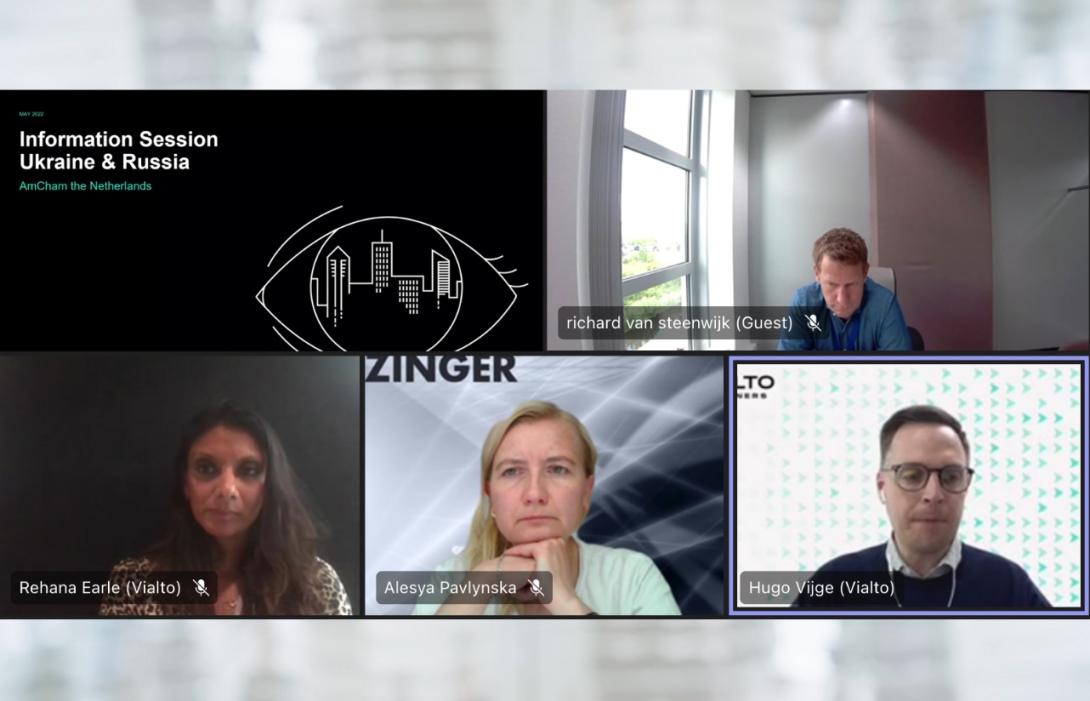On May 19, AmCham’s People Committee hosted an information session for employers working with Ukrainian and Russian employees in collaboration with Richard van Steenwijk, Hugo Vijge and Rehana Earle from Vialto Partners (previously PwC Global Mobility Services) and Alesya Pavlynska, Counsel at Arzinger and Co-Chair of AmCham Ukraine’s Human Capital Committee.
Hugo Vijge, Senior Manager of Immigration at Vialto Partners Netherlands, discussed the Temporary Protection Directive, which grants Ukrainian nationals, protected persons, and their family members temporary protection in EU Member States. It is valid for one year but can be extended to a maximum of three years. Additionally, he briefly addressed work rights for Ukranians, stating that employed or self-employed activities are permitted, but that there are restrictions regarding work notification and contract type. For Russian nationals, visa options have become more constrained due to the introduction of new restrictions, lengthy processing times, and security checks that are a result of the conflict.
Rehana Earle, Director Global Mobility Tax at Vialto Partners UK, talked about the different approaches organizations are currently taking. She observes a shift towards providing benefits in kind in addition to / instead of cash allowances; transferring displaced employees onto fixed term local employment contracts in the host location; compensation reviews for Russian employees relocating as a result of the crisis; and enhancement of compensation and benefits for Ukrainian ‘new hires’.
Richard van Steenwijk, Director of Global Mobility Tax at Vialto Partners Netherlands, described different employment circumstances of (fled) Ukrainians and their tax implications: individuals have found a job with a (new) ER in a host country, after a stay of a few months in this new work country (NL); individuals working from other (neighboring) host countries (NL), still for their existing Ukrainian formal ER; individuals working from other (neighboring) host countries for a group entity there, still under the existing contract with their Ukrainian ER; individuals working from other (neighboring) countries under a (new) contract with a (new) ER in EE’s same host country for a ER in a different country.
Aleysa Pavlynska, Counsel at Arzinger and Co-Chair of AmCham Ukraine's Human Capital Committee, then shared her insights on the subject. She discussed changes to employment law as a result of martial law, such as the simplification of the hiring process in some cases, the granting of greater flexibility to employers for unilateral changes to employment terms, the restriction of trade union rights, and the suspension of collective bargaining agreements. In addition, she discussed the difficulties faced by international employers with Ukrainian employees, such as relocation and evacuation, lack of proper communication with some employees, inability to fully engage in work activities due to military actions, air raids, etc., and the obligation to release employees if they join the Ukrainian Armed Forces of Ukraine and retain their average earnings and job.
AmCham expresses its sincere gratitude to Richard van Steenwijk, Hugo Vijge, Rehana Earl, and Aleysa Pavlynska for sharing their expertise on the topic.
